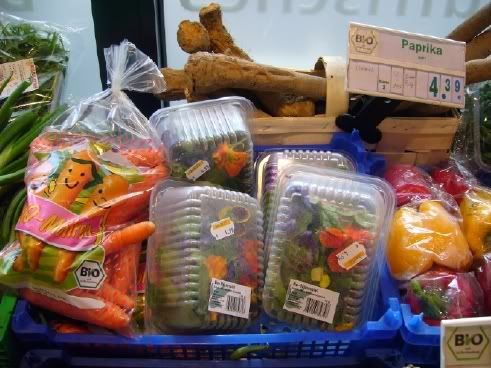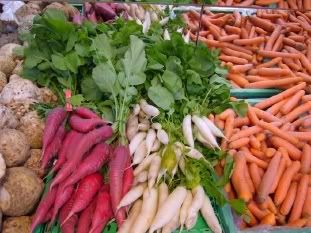Is Bio Besser?
Sunday, 8 April 2007 by kinakoJam

Bio is big in the Bundesrepublik.
When I first arrived here, I stayed with dear friend Lars Vegas
. Lars is a very healthy man: he gets up every morning, eats a banana and goes jogging. My first impressions of German life came from Lars' airy, light-wooden floored apartment, his rosy-cheeked son Tony, and the fact that Lars would hop on his bicycle to go buy organic milk in those nice wide-mouthed glass bottles, Bionade
soft drinks, and always a plentiful supply of Voelkel
juices.
Germany has several different gastronomical identities, so it seems.
There is of course the traditional potato-cabbage-pork-bread-cream variety, such as in days of old when breakfast and dinner could both well consist of a hearty slice of black bread topped with cold cured Blutwurst (blood pudding) and some raw onions, lunch being the time for a serious meal of starchy Knoedel dumplings, braised cabbage, apple sauce and some delicious meat or other. Zum beispiel.
Then (apart from the gigantic middle ground of typical packet-goods and whatever-goes) there's the other big diet trend of organic food, raw delicious mueslis called 'Body Power' or 'Sinner's Träum', and beetroot & apple juice. Eaten by people who wear rose-scented Dr Hauschka mascara.

It's definitely not (just) a hippy thing though:
According to Prof. Ulrich Hamm, University of Kassel, 40 to 60 new organic supermarkets open each year and the activities of the discounters noticeably contribute to market growth. (Hmm, note this phrase 'activity of the discounters').
Also according to Ulrich, organic food sales rose by approx. 16 % in 2006 to a good 4.5 billion EUR.
Organic food worth a total of 14.5 billion EUR was consumed in the European Union in 2005, of which 27 % was in Germany alone the most important European consumer market ahead of Great Britain (17 %), France (14 %) and Italy (12 %).
The organic boom started in the 80s, but German consumers were more recently frightened by BSE and GM food, leading them to up the ante. Berlin has over 30 organic supermarkets. I can think of at least five quite big organic supermarkets in Cologne off the top of my head (Erik estimates around 20), while in the trendier areas there are also smaller health food stores on virtually every second street.
Going to a German biomarkt is much more pleasant than going to a regular supermarket (unless you count the fancier aisles of upscale delicatessan supermarkets). The lighting is softer, the food is packaged in a way that says "I care", and the trolleys at our local Basic
supermarkt are these vibrant red plastic wheely toys onto which you can attach the yellow plastic basket.
The veges are displayed in appealing piles... there are many tofu products and many varieties of juice. It's just an ober feel-good experience. (note: ober is more grammatically correct than über)

The question that's been lingering on my mind, though, is: is Bio besser?
It looks appealing, it's better for the environment (erm at least we can be sure the stuff that's produced locally is), and a European Commission investigation late last year found that "organically produced food has a higher nutritional value than conventional food."
But is it better tasting? And is it good value for money?
There some obvious big pluses to having a biomarkt on the corner: a good range of grains, a daily chance to feel virtuous. Produce-wise, I do appreciate that Basic has shiny green plastic buckets filled with Schwarzwurzeln
(burdock), and fresh paprika root (see photo above), and cute flower salads, again in conveniant plastic containers.
However the price, as Maytel has mentioned before, has social implications...there's something implicitly elitist about organic supermarkets, I've always thought. The attention to detail and simple, effective packaging in Germany is VERY pleasing to me but the effect is overall consumerist: the shininess and wholesome appeal of goods in those places really tricks you into throwing various small expensive items into your brightly-coloured basket. A tub of 'sultan's freude' cream cheese with dates and spices here, a pottle of berry-flavoured goats milk yoghurt there.
One of the main reasons I end up there each week is for Japanese ingredients: it's a supply & demand thing. There aren't too many Japanese people in Cologne, so if we really need some Mirin, it's gotta come from the Japanese section at the biomarkt. And I do whole-heartedly appreciate that in an emergency I can get a small packet of macrobiotic white miso 'an die Ecke', even if it does cost six euros from Basic.
But it does sort of grate that half their macrobiotic stuff is just barely-disguised repackaged food from Japanese importers: their 30g gold-sided 12 euro boxes of 'macrobiotic' matcha green tea powder turned out to contain a can which still had the japanese print on it and which you can get at the Japanese supermarket in Duesseldorf for 3 euros.
Rant, rant... my feelings about the biomarkt are so complicated. Biomarkt, I do care, I do.
The other day when I took the above photo, in the midst of admiring fresh produce I was suckered into buying one very beautiful punnet of strawberries from France for 4 or 5 euros. They looked so perfect. But when I got them open, one was moldy and the others seemed to lose their sheen before my eyes, developing white-ish soft spots.
Now, I don't like being ripped off: even by wholesome salt-of-the-earth types.
Remember above that Ulrich claimed "activities of the discounters noticeably contribute to market growth"? It seems that even in the world of bio, one is better off not placing too much trust in supermarkets and instead just keep dreaming of the day when you will have enough time to visit markets and buy straight from producers (ahh, like Maytel mentioned, the slow food demon raises its unattainable head).
You know it's all my fault in the end (another food guilt complex): I should be eating only local things that are in season or naturally long-lasting, like those phallic white asparagus (it's Spargelzeit!
), and properly-stored apples.
The charismatic Carlo Petrini, founder and President of Slow Food, spoke at the February 2007 BioFach conference in Nürnberg. The closing report said he "urgently pursued part two of his life's motto again at the opening of the exhibition, at a press conference and in many personal discussions. His passionate opening appeal for top-quality food and against genetically modified food struck the right note in the hearts of exhibitors and visitors."
Top quality!! Due to consumer demand, and with biomarkts striving to feed us South African porcini mushrooms and truffles from China and fucked French strawberries, there's no guarantee of quality: so buyer beware, and don't assume everything bio is better.
The problem at the root of the bio quality issue is Germany's rising organic consumption - such a steep rise in demand that organic food stocks across Europe are dwindling, and forcing German importers to advertise on the Canadian trade website for organic blueberries... organic oats... lord god, somebody send us some more organic maple syrup! We beg of you!
The whole conundrum can be read about in this
article, which contains the sombering paragraph: ""Oats are sold out all across Europe, you can't buy eggs anywhere in Germany and France, and no one knows how consumers are going to get potatoes from the middle of January on."
(So alarmist... I haven't noticed any freerange egg deficit! but then again who knows where they are coming from..Chile or Morocco perhaps?)
While importers claim the mileage doesn't result in lack of quality, I'm skeptical...they surely can't be as fresh ... or maybe big supermarkets are just bad in general - which leads us back to the mysterious activities of the discounters, and my rotten strawberries.
The catch phrase of the BioFach meeting of the international organic food industry in Nuremberg was "It’s the organic mix that counts: trust + health + enjoyment."
I'm sorry, Basic: I don't quite trust you. But I will still buy bio, at least 40-50% of the time.

you should read omnivore's dialemma, includes really interesting debate on what author terms big organic versus local food chains...plus interesting ecological refute to vegetarianism
hmm tell me more about this ecological refute to vegetarianism! i am eager to feel good about meat.
well I suggest you read the book for a more eloquent discussion, suffice here to say that he states that the problem with animal rights groups in general is that they view the issue very much from that of a liberal human rights background and apply these ethics to that of the rights and suffering of the individual "pig", whereas the author says that, although he disagrees with the inhumane treatment of animals (primarily due to it's environmental consequences e.g. effluence from pig farms) he also states that domesticated animals have coevolved with human beings and the suvival of their species of the whole heard is reliant on human consumption of part of that heard.
It also has a fascinating section on mushrooms, who knew they were so mysterious
will try 2 track the book down!